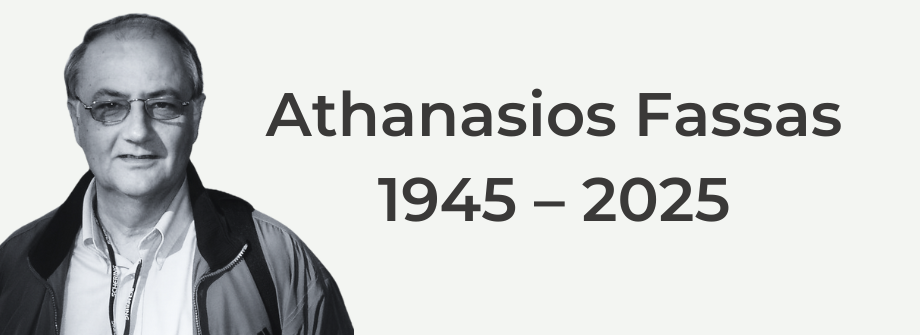
Written by Ioanna Sakellari, Head Director, Haematology Department, George Papanicolaou General Hospital, Thessaloniki, Greece.
Athanasios Fassas was born in Thessaloniki and studied medicine in the Aristotle University. After having qualified in Haematology in 1979, he pursued advanced training in Haematology-Oncology at the renowned Hôpital Paul-Brousse and Institut Gustave-Roussy in Villejuif, France, where he also worked in Experimental Immunotherapy under the mentorship of Professor G. Mathé. Further enriching his clinical expertise, he served as a visiting physician at the Bone Marrow Transplant Unit of Kantonsspital Basel, in 1983.
He was the head of the Department of Haematology and the Bone Marrow Transplantation (BMT) Unit at George Papanicolaou Hospital in Thessaloniki, since its founding 1985 till his retirement in 2010. Since 1998 he co-directed the Department with Dr. Achilles Anagnostopoulos, also EBMT awarded with the long life clinical achievement award. Notably, BMT Unit was the first one to become operational with autologous haematopoietic transplantation and the use of fresh bone marrow as a graft source, in Greece in 1985, thanks to Athanasios Fassas’ vision and determination. His pioneer work, in 1995, has been the use of autologous stem cell transplantation in treatment of patients with severe autoimmune diseases, multiple sclerosis, in particular. His efforts were contributory in establishing not only bone marrow transplantation as a standard therapeutic approach in Greece but the holistic treatment of acute leukaemia’s, lymphomas, myelomas and all haematological malignancies. His lifelong commitment to research and education has left a profound legacy in the medical community. Under his leadership and with the assistance and dedication of his team, the department that he founded has gradually grown into a centre of excellence, the largest transplantation-cellular therapies unit in Greece, home to specialised laboratories in haemato-immunology, cryobiology, stem-cell culture, cytogenetics, molecular haematology and gene therapy.
His administrative and scientific roles include serving as Chairman of the Hellenic Society of Haematology’s working party of Stem Cell Transplantation and as Secretary of the Autoimmune Working Party of the EBMT (March 1998- March 2004). His achievements have been recognised by multiple awards, the Award of Excellence of the Research Committee of the Aristotle University of Thessaloniki in 2005, honouring the most impactful scientific activity of the year. He was also awarded honorary membershipby the EBMT in recognition of his lifelong outstanding contribution to the BMT field and the network of the EBMT. He was dedicated to the EBMT spirit from the very first years along with its clinical guidelines and quality system ISCT-EBMT (JACIE). This was the reason that BMT unit in George Papanicolaou Hospital was the first one JACIE accredited unit in Greece. The above roles reflect his influential appeal in shaping haematological practice both nationally and across Europe. Throughout his career, he remained committed to training new generations of physicians and researchers, contributing to the international scientific literature and advancing the clinical practice of haematology. His pioneering spirit, dedication to innovation, and compassionate approach to patient care continue to inspire and elevate haematologists into thinking globally and caring deeply.
His legacy is based upon his thoughts – wise words in his last lecture in December 2024:
"MEDICINE IS AN ART. Medicine is attractive because it is charming and unavoidably it is based on science and research progress. The task to achieve it demands time, sacrifices and family compromises. Once you get involved you become "addicted" to it and that’s because it offers substantial knowledge of human nature and therefore a close relationship between doctors and patients. The collateral beauty of medicine makes you dial into yourself and get to know yourself better."
Athanasios Fassas was a leading figure in Greek haematology, known for his visionary leadership, grace, scientific contribution and academic excellence. With his knowledge marked by deep expertise, multidimensional intellectual cultivation, refined civility and deep empathy, he shaped the whole medical scientific team of the Haematology Department toward unwavering dedication and a strong sense of duty to patients and families. He was an outstanding haematologist, transplanter who excelled in science and society. We, his team, feel blessed for the horizons opened under his inspiration and mentorship into the journey from the autologous transplantation of fresh marrow to alternative allogeneic transplantation, cellular therapies and gene therapies.